 I was raised in a trailer court on the south side of St. Louis. My daddy was a truck driver, and my mom worked in accounts payable at a local distribution facility. Our trailer was parked in the middle of the court at the half-turn that separated the top from the bottom. Ironically, this is where I would live most of my adolescent and young adult life — somewhere in the middle and a little behind the curve. Throughout my teenage years, I did not place a high value on formal education. I did, however, have a very strong work ethic. I waitressed midnight shifts at the Waffle Houses scattered up and down I-55. After years of flipping omelets and pouring hot coffee, I was faced with a desperate situation that marked a turning point in my life: I was promoted to shift manager.
I was raised in a trailer court on the south side of St. Louis. My daddy was a truck driver, and my mom worked in accounts payable at a local distribution facility. Our trailer was parked in the middle of the court at the half-turn that separated the top from the bottom. Ironically, this is where I would live most of my adolescent and young adult life — somewhere in the middle and a little behind the curve. Throughout my teenage years, I did not place a high value on formal education. I did, however, have a very strong work ethic. I waitressed midnight shifts at the Waffle Houses scattered up and down I-55. After years of flipping omelets and pouring hot coffee, I was faced with a desperate situation that marked a turning point in my life: I was promoted to shift manager.
My promotion at the Waffle House was a watershed moment because I realized that how I spent my days is how I would spend my life, and if I wanted to satisfy a growing, unnamed stirring inside of me to do something, then I had to make a sincere move in that direction. After a year of barely passing junior college for lack of trying or even going, I was determined to see it through. I finished out my undergraduate degree and first master’s degree at a small liberal arts college in Tennessee.
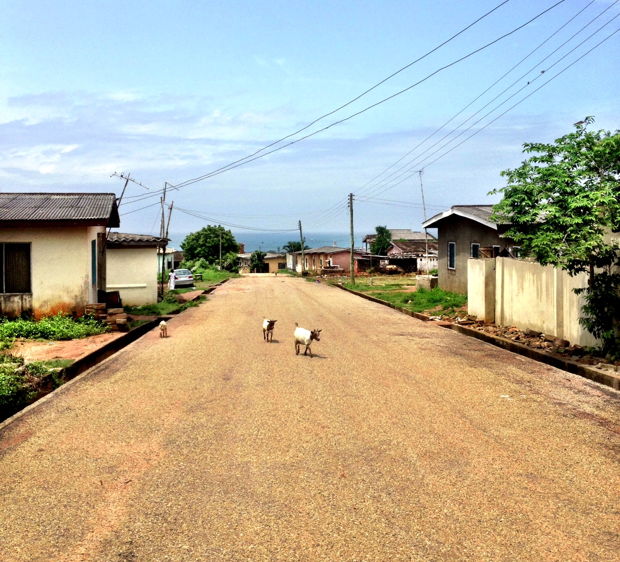
I was selected to go to Winneba, Ghana, for two months with a group of seven other female students to complete the requirements for our student teaching. As the only secondary education major, I was placed in a junior high classroom away from the rest of the other girls. Though I was an education major and believed in the power of education because of its influence on my own life, I did not really get what people meant when they talked about having a “passion for children.” But as I spent my days in Winneba with kids as my only companions, before I even knew what to call it, I had discovered that “passion for children.” When the internship period was over, I made a tearful, painful return to the United States. Though I was now able to have cold milk, fresh salads, and central air, what I really longed for was to sleep under my mosquito net with only the breeze to cool me and to drink the lukewarm water. Even though my friends in the United States welcomed me home, I missed my kids in Ghana and would have traded all the nights at coffee houses and movie theaters for just one long afternoon at the beach with them again. Though my body was in America, my heart never really came back from Ghana.
I loved the people in Winneba, but I was clueless about the social and political culture. I had never done a lot of research before I traveled. I rather liked the sensation of jumping in blindly, so it was only after I returned from Ghana in 2010 that I hit the Internet. What I found was startling. How was I completely unaware that I lived in a community where people profited from such crime and abuse? Winneba is a sprawling coastal community whose streets are never in short supply of wandering goats or affectionate smiles. This is the Ghana I knew — beaches, inviting smiles, and women selling jollof rice every twenty paces.
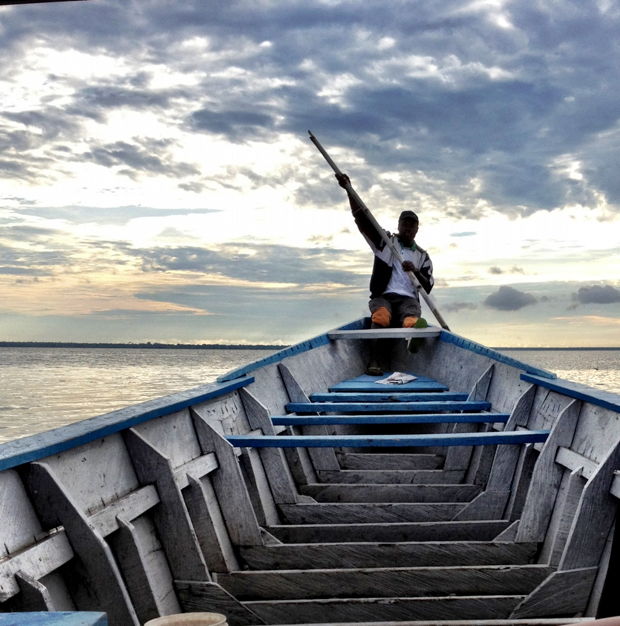
Because I had spent so much time at the beach with the kids, I had seen the wood-carved boats lined up along the coastline with groups of men, women, and children sitting in circles mending torn nets. Fishing is one of Ghana’a largest economic industries. In coastal communities and townships lined up and down Lake Volta, fishing is an economic and cultural staple. What I did not see was another trade also in high demand that exists alongside the business of fishing. It is an industry that buys, sells, and trafficks children.
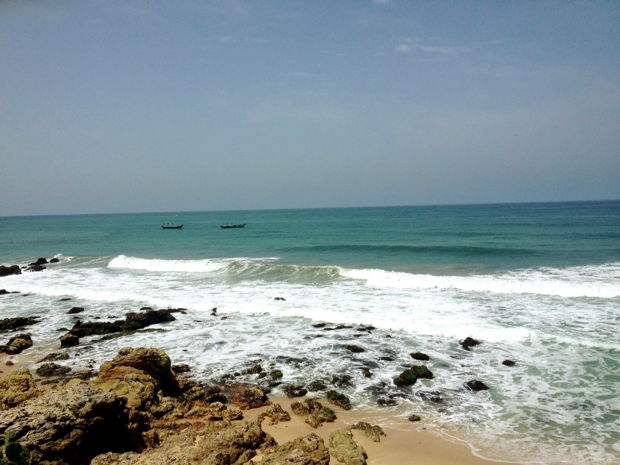
But also on the Internet, I found Challenging Heights, an organization located in Winneba that works to rescue and rehabilitate children who have suffered this dreadful fate. After some email exchanges and an invitation from Challenging Heights to volunteer as a teacher, I knew where I would be spending my summer. After finishing my first year as a graduate student at Southeast Missouri State University, I packed up my bags and made a beeline back to Winneba.
One day, as the kids and I were walking home from school, sweating and pounding the earth with our dirty, tired feet, Ebenezer, one of my students at Challenging Heights, asked me, “Madam, why do they say I should get an education?” Panicked that I was confronted with the most important question a student can ask his teacher, I hastily replied, “Eben, what do you want to be when you are grown?” He thought for a minute and said, “I want to be rich so I can help people.” I then explained that an education will give him the opportunity to make choices about his life. From my own experience, I knew that being born into an inferior condition does not mean being stuck in one. Eben seemed satisfied with my answer, though I recalled the years of night shifts at the Waffle House that taught me this lesson the hard way.
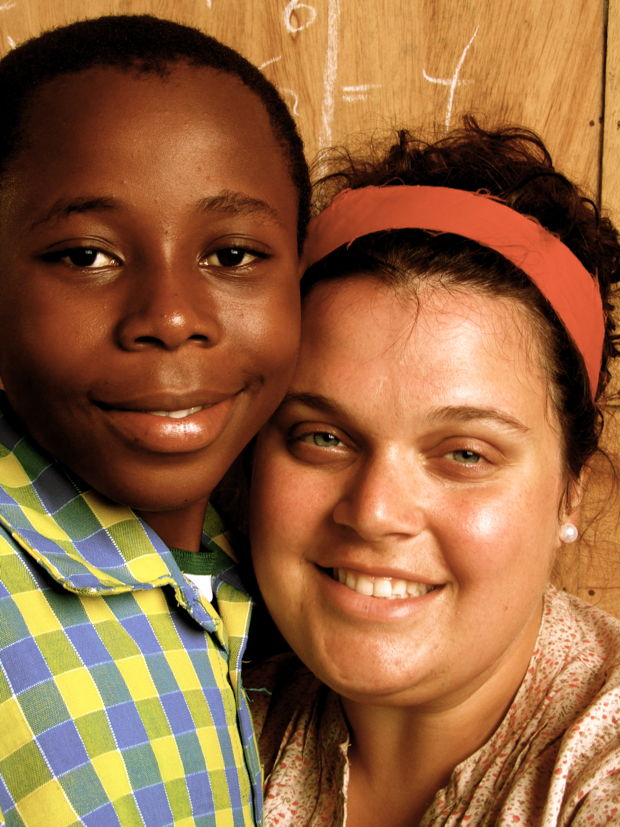
Since 2010, I have made multiple annual trips to Ghana, working with local organizations that advocate for children to prevent them from being trafficked and to rescue them after they have been trafficked. Challenging Heights operates a rehabilitation shelter that provides kids who have been rescued with counseling, medical attention, and an education. This was the place I called home when I was in Ghana, but during a visit over Christmas in 2012, I knew it was time to move on. I longed to commit myself to a community, but I had no idea how that would look. Without much else to go on, I knew that all of the kids with whom I had developed a really strong bond were from a town called Senya. I walked to the roadside one afternoon, as the kids at the shelter were settling in for their afternoon naps, and I asked the driver if he knew how to get to Senya. He pointed ahead and through his broken English and my broken Twi, we set out. Through a rather miraculous series of events, I met a family who was renting a room in their house, which just happened to be directly in front of the school where all the kids I knew would attend. I was terrified and full of reasons why I should not be venturing out on my own, but the Holy Spirit gave me a peace that truly did extend beyond my understanding.
Senya is a source community for child trafficking because of its poverty and geographic proximity to the sea. I love the people in my community. I love the nuances of Ghanaian culture that I have learned from living with them as they live. To say that I "serve them" feels very one-sided. Living in true community means reciprocity. We learn from each other. I cannot estimate the impact I have had on the lives into which I have been invited in Ghana, but the deep honor of being called "sister" and "mama" by a growing group of friends and children has left an indelible mark on my faith and my professional pursuits.
If social change is ever going to materialize in the developing world, I am persuaded that it must come from the institutions that already exist and the people within that society must be catalysts in the process. Too often, humanitarian efforts that seek to eliminate poverty and foster educational opportunities do not include the people in that society in the process of assessing programs and developing innovative ways of addressing social burdens. And unfortunately, secular humanitarian efforts leave out the religious threads that bind and give shape to the culture — and ultimately to the people. Leaving the religious component out of any effort to serve or "develop" overlooks the individuals involved in those causes. Christ has taught me that it is not enough for the Christian to love or be committed to a cause. We must love and be committed to people. I must see and know the children I hold, love, and sometimes have to let go. If I only see causes and campaigns, I am in danger of forgetting (or never knowing) the most tender feature of being a child of God: that God sees and knows me individually, too.
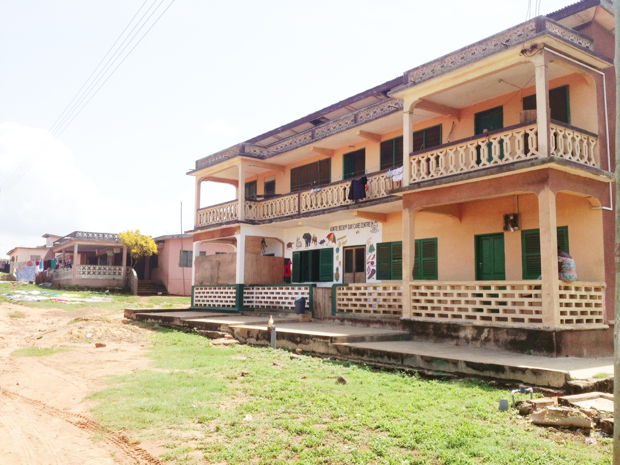
My small victories in Ghana are personal ones. When Desmond, an abandoned child with a disability who now lives at an orphanage near my house, learns to walk, my heart will swell with joy at what will not happen to Desmond in his life simply because he is independently mobile. And then there is Mabel, a young woman who reminds me of myself when I was her age. Mabel is like a younger sister to me, but I have prayed for her with the same determination I imagine a mother prays for her wandering child. On the day that Mabel will choose a Senior High School to attend, I will look on her with deep love and profound admiration for all she will have overcome to be at that place in her life. Maybe then she will believe me for all the times I have repeated to her, “Trust me, it will be worth it.”
My larger victories in Ghana will be professional ones. I began a PhD program in Higher Education Administration at Saint Louis University in 2012, where I am thriving and growing in a learning environment that shares my personal and professional beliefs about service and fosters critical thinking about research endeavors that would seek to bridge two disparate classes in developing countries like Ghana: those who are able to attend a university and those who are not. In Ghana, higher education is for the economically elite. Gender equity has seen major gains in all sectors of education in recent years, but gross economic inequality remains. The research identifies a correlation between higher levels of education and higher socioeconomic status. Essentially, as students advance through levels in their formal education, specifically from Junior High School to Senior High School, those who cannot afford to attend school simply stop.
In view of eternity, I cannot stake an absolute claim that education is the most important thing that can be given to anyone. I know many folks have staked their entire lives and careers on the notion that education is the great equalizer. As Christians, we know — or ought to know — that it is not. I think and pray on-end about the ministry and the heart that God has given me for my children in Ghana. Of course I want them to go to school and be sponges of knowledge, because a formal education will open doors for them and will exponentially increase their potential. I have a deep respect for organizations that work tirelessly and sacrificially to not only rescue kids but also provide them with an education and reunite them with their families. This claim I have made makes me wonder then what my role is. By the time I get to these kids, a lot has already been done for them.
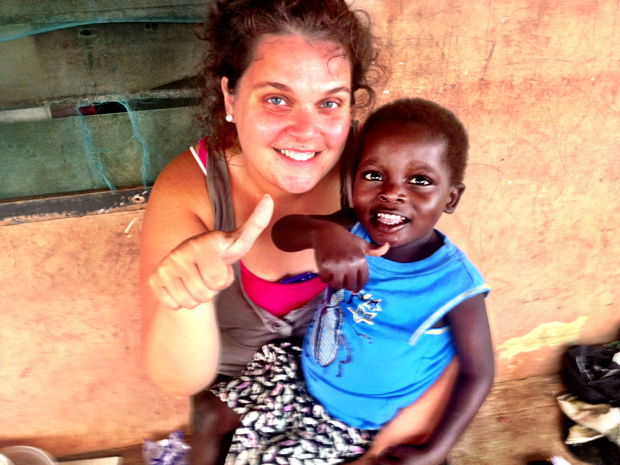
And so what if my ministry is never about rescue, rehabilitation, education, and reunification, per se? The truth is that some children will not grow up to have prestigious jobs that a university or even secondary school education could provide for them. I am no longer certain this is the most important thing. I think of one boy in particular, Essibu. If Essibu chooses to be a fisherman and take care of his family and raise his children in God’s love, I’m hard pressed to believe there is anything more noble.
My earnest prayer is that the legacy of my relationship with my kids is that they will know regardless of how exceptional or common society considers their lives, salvation is really the only equalizer. It is at the cross of Christ that we all achieve true equality. The truth of this bold claim is more empowering than all of the world’s annals of knowledge. They must know that no matter where they come from or what they have done or what has been done to them, they are deeply loved by a Father who is mindful of their condition. His heart is moved by their cries.
Zephaniah 3:14-17 promises five things:
The Lord your God is with you.
He is mighty to save.
He will take great delight in you.
He will quiet you with his love.
He will rejoice over you with singing.
The more I am in Ghana, and the more I love, and the more I have to let go, the more I am convinced that this is the most important thing any of us could ever hope to know.